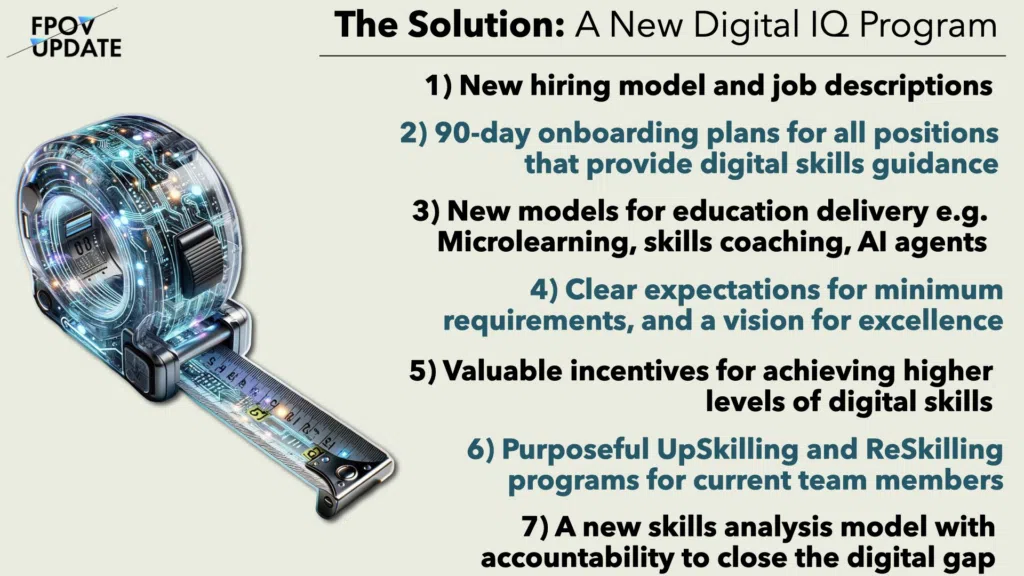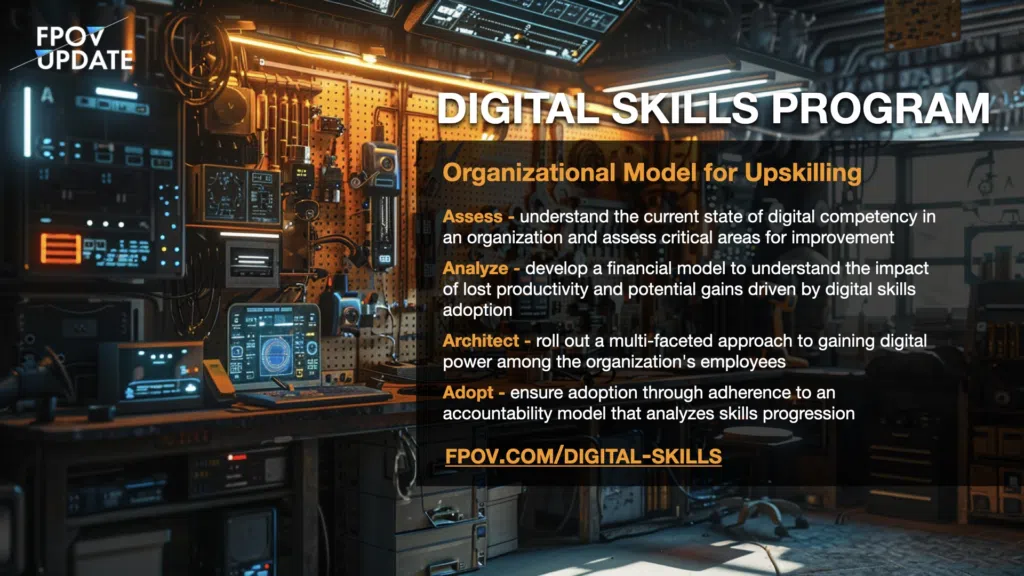Written by Chandler Wint with Future Point of View, a strategic business partner of Tilson.
In our rapidly advancing digital world, the necessity for organizations to cultivate a strong Digital IQ among their teams has never been more pressing. In FPOV’s recent update, “Digital Skills: A New Model for Building Digital IQ on Your Teams,” the first installation of the 2024 Update Series, Scott Klososky sheds light on this critical challenge. This blog delves into the key takeaways and actionable insights from the virtual event, emphasizing the urgency of equipping teams with the digital prowess required to navigate and thrive in the technological landscape of the future.
The webinar opened with an exploration of the burgeoning skills gap that poses a significant barrier to organizational growth and efficiency. This gap, between the potential offered by current digital tools and the actual capability of teams to utilize these tools effectively, has widened alarmingly in the wake of rapid technological advancements, especially with the advent of Artificial Intelligence (AI). Citing a comprehensive study involving 4,000 executives, the Scott highlighted a staggering weekly productivity loss of $1.14 million within large organizations due to this skills gap. This underutilization of digital tools represents a “tax” on organizations, eroding profitability and hindering competitive edge.
The Advent of AI and the Hybrid Mind
A pivotal discussion point was the transformative impact of AI on the human cognitive process. The webinar delineated the evolution from the traditional use of tools augmenting human intellect to the integration of AI, fostering a “hybrid mind.” This hybridization signifies the fusion of human intelligence with synthetic, AI-driven capabilities, heralding a new era of cognitive enhancement. However, this evolution also underscores a burgeoning challenge: the skills gap could further widen if teams are not adept at leveraging these AI-enhanced capabilities. The ability to harmonize human creativity with AI’s computational power is poised to become a critical differentiator in the digital age.
Overcoming Challenges in Digital IQ Development
Identifying the core challenges in fostering digital IQ within organizations was a major focus of Update #1. The webinar outlined three primary obstacles: the persistent skills gap, outdated and ineffective digital skills education methods, and a prevalent lack of motivation among team members towards digital skill acquisition. Conventional training modalities and peer-to-peer learning initiatives have fallen short in equipping individuals with the necessary digital competencies. Furthermore, the absence of clearly defined incentives and mandates for digital skill enhancement has contributed to a motivational void, hampering efforts to elevate digital IQ across organizations.

Proposing a New Digital IQ Program
During the Update, Scott delivered introduced an innovative model designed to elevate digital skills across teams systematically. This comprehensive model encompasses several key strategies:
- New hiring model and job descriptions: This strategy emphasizes the integration of digital agility and a propensity for continuous learning into the very foundation of organizational roles. By prioritizing these attributes in the hiring process and explicitly stating them in job descriptions, organizations can cultivate a workforce inherently aligned with digital excellence.
- 90-day onboarding plans for all positions that provide digital skills guidance: Advocating for an in-depth approach to onboarding, the webinar highlighted the importance of programs that not only focus on technological proficiency but also emphasize relational achievements within the organization. A meticulously crafted 90-day onboarding script, incorporating both technological milestones and relational goals, was proposed to jumpstart new hires’ integration into the digital culture of the organization.
- New models for education delivery e.g. Microlearning, skills coaching, AI agents: The transition towards microlearning, skills coaching, and the utilization of AI-driven educational tools represents a departure from traditional learning methodologies. By embracing short-form content, personalized coaching, and intelligent tutoring systems, organizations can offer more engaging and effective learning experiences tailored to the digital age.
- Clear expectations for minimum requirements, and a vision for excellence: The establishment of explicit expectations regarding digital proficiency, coupled with accountability mechanisms, is crucial. By integrating these expectations into performance evaluations and making them a cornerstone of professional development, organizations can foster a culture that values and rewards digital excellence.
- Valuable incentives for achieving higher levels of digital skills: Developing incentive systems that reward digital skill acquisition and application is vital. Whether through financial rewards or recognition programs, these incentives can motivate individuals to pursue and achieve higher levels of digital proficiency.
- Purposeful UpSkilling and ReSkilling programs for current team members: Addressing the need for continuous skill development, the model advocates for ongoing upskilling and reskilling efforts. As technological advancements introduce new tools and displace existing job functions, organizations must be prepared to equip their teams with the skills required for future success.
- A new skills analysis model with accountability to close the digital gap: Regular assessment of the digital skills gap is essential for identifying areas of improvement and measuring progress. By understanding the extent of the gap and its impact on organizational performance, leaders can devise targeted strategies to mitigate the “skills gap tax” and enhance digital IQ across the board.
Download Tilson’s free Skills Gap Analysis tool here.
The Imperative of Digital IQ
Update #1 underscored the critical importance of building digital IQ within teams as a key driver of competitive advantage in the modern business landscape. In an era defined by rapid technological change and digital innovation, the ability of teams to harness and leverage digital tools effectively is paramount. The proposed model offers a strategic roadmap for organizations seeking to close the digital skills gap and unlock the full potential of their technological investments.

Expanding the Model
- Embracing a Culture of Continuous Learning: Fostering a culture that prioritizes continuous learning and adaptation is paramount. Organizations should encourage curiosity and experimentation among their teams, creating an environment where learning new digital skills is not only encouraged but expected. This cultural shift can be facilitated by leadership demonstrating a commitment to their own digital learning, setting a powerful example for the rest of the organization.
- Leveraging Technology for Collaborative Learning: The use of collaborative technologies can significantly enhance the learning experience. Tools such as digital collaboration platforms and social learning management systems can facilitate knowledge sharing and peer learning, amplifying the impact of formal training initiatives. By creating digital spaces where employees can share insights, ask questions, and learn from each other, organizations can foster a more interconnected and digitally savvy workforce.
- Customizing Learning Pathways: Recognizing that individuals have varying learning styles and paces, customized learning pathways can greatly improve the effectiveness of digital skills training. Utilizing AI to tailor learning experiences to individual needs and preferences can help maximize engagement and retention. Personalized learning journeys, aligned with career goals and organizational objectives, can empower employees to take ownership of their digital development.
- Measuring and Rewarding Progress: Implementing mechanisms to measure and reward progress in digital skill development is crucial. Beyond traditional assessments, organizations can leverage digital badges, certifications, and progress tracking to recognize and incentivize achievements. Celebrating milestones and successes in digital learning not only motivates individuals but also highlights the organization’s commitment to digital excellence.
- Integrating Digital Skills into Strategic Objectives: Digital skill development should be aligned with the organization’s strategic objectives, ensuring that efforts in enhancing digital IQ directly contribute to overarching goals. By integrating digital skills into the fabric of organizational strategy, leaders can underscore the importance of digital literacy in achieving business success, driving more focused and impactful learning initiatives.
- Fostering Digital Leadership: Developing digital leadership skills among managers and executives is essential for guiding teams through digital transformation. Leaders equipped with a strong digital IQ can more effectively champion digital initiatives, inspire their teams, and navigate the complexities of the digital landscape. Investing in the digital development of leadership can amplify the impact of digital skill enhancement efforts across the organization.
The “Digital Skills: A New Model for Building Digital IQ on Your Teams” update offers a compelling blueprint for addressing one of the most pressing challenges organizations face in the digital era. As we venture further into a future dominated by technological innovation, the importance of equipping teams with a robust Digital IQ cannot be overstated. By embracing the comprehensive model proposed in the webinar and expanding on its principles, organizations can embark on a transformative journey, harnessing the power of digital technologies for sustained growth and success.
Tilson is committed to helping companies reach peak performance by providing them with the workforce services and insights they need to thrive. Reach out to Tilson today.
Download Tilson’s free AI Strategy tool here.



